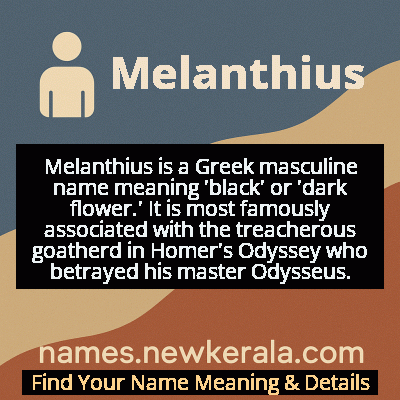Melanthius Name Meaning & Details
Origin, Popularity, Numerology Analysis & Name Meaning of Melanthius
Discover the origin, meaning, and cultural significance of the name MELANTHIUS. Delve into its historical roots and explore the lasting impact it has had on communities and traditions.
Name
Melanthius
Gender
Male
Origin
Greek
Lucky Number
5
Meaning of the Name - Melanthius
Melanthius is a Greek masculine name meaning 'black' or 'dark flower.' It is most famously associated with the treacherous goatherd in Homer's Odyssey who betrayed his master Odysseus.
Melanthius - Complete Numerology Analysis
Your Numerology Number
Based on Pythagorean Numerology System
Ruling Planet
Mercury
Positive Nature
Adventurous, dynamic, curious, and social.
Negative Traits
Restless, impatient, inconsistent, prone to indulgence.
Lucky Colours
Green, white.
Lucky Days
Wednesday.
Lucky Stones
Emerald.
Harmony Numbers
1, 3, 9.
Best Suited Professions
Sales, marketing, travel, entertainment.
What People Like About You
Versatility, charisma, adventurous spirit.
Famous People Named Melanthius
Melanthius of Rhodes
Ancient Greek Painter
Renowned painter mentioned by Pliny the Elder, known for his detailed depictions of gods and heroes
Melanthius the Goatherd
Mythological Character
Infamous goatherd in Homer's Odyssey who betrayed Odysseus and sided with Penelope's suitors
Melanthius of Athens
Philosopher
Student of Socrates mentioned in philosophical dialogues, known for his rhetorical skills
Name Variations & International Equivalents
Click on blue names to explore their detailed meanings. Gray names with will be available soon.
Cultural & Historical Significance
In broader Greek cultural context, Melanthius represents the complex relationship between social classes and the potential for servants to either uphold or undermine the household order. His story serves as a cautionary tale about the fragility of social hierarchies and the importance of treating subordinates with respect. The character's ultimate punishment—being mutilated and left to die—underscores the severe consequences of betrayal in Greek moral philosophy. Through centuries of classical education, Melanthius has become an archetypal figure representing the untrustworthy servant, influencing Western literary traditions about loyalty and betrayal.
Extended Personality Analysis
Individuals named Melanthius are often perceived as complex characters with potential for both loyalty and betrayal, reflecting the name's mythological origins. They may possess sharp intelligence and practical skills, much like the mythological Melanthius who managed Odysseus's herds, but could struggle with moral ambiguity when faced with difficult choices. The name carries an inherent tension between capability and integrity, suggesting someone who might be highly competent but potentially untrustworthy under pressure.
Modern psychological interpretations might view Melanthius as representing individuals who are pragmatic to a fault, willing to adapt their loyalties based on changing circumstances rather than adhering to rigid principles. This complexity makes the name suitable for characters or individuals who embody moral gray areas—neither wholly good nor entirely evil, but shaped by their choices in challenging situations. The mythological association suggests someone who might excel in practical matters and survival skills but requires strong moral guidance to avoid destructive paths. The name implies a person who could be either a valuable ally or a dangerous adversary depending on their alignment and the treatment they receive from others.
Modern Usage & Popularity
In contemporary times, Melanthius remains an extremely rare given name, primarily used in academic, literary, or Greek cultural contexts rather than for newborn children. Its usage is mostly confined to classical studies, historical fiction, and as a character name in works exploring Greek mythology. The name's strong association with betrayal in the Odyssey has limited its popularity as a personal name, though it occasionally appears in Greek families with strong classical interests. In modern Greece, the name is virtually unused for newborns, with parents preferring more positive mythological names or contemporary Greek names. However, it sees occasional revival in literary circles and among classical scholars who appreciate its historical significance and linguistic roots. The name's rarity makes it distinctive but carries the burden of its treacherous mythological legacy, limiting its appeal for modern parents seeking names with positive connotations.
Symbolic & Spiritual Meanings
Symbolically, Melanthius represents the complex interplay between loyalty and betrayal, service and rebellion. The name embodies the concept of 'the traitor within'—someone who should be trustworthy but chooses to betray that trust for personal gain or survival. The 'black' or 'dark' element in the name's etymology (from 'melas') symbolizes not just physical darkness but moral obscurity and the shadow aspects of human nature. In a broader metaphorical sense, Melanthius can represent the internal conflicts between duty and desire, tradition and change, or stability and opportunity. The character's role as a goatherd adds pastoral symbolism, connecting him to themes of nature, animal instinct, and the raw, unrefined aspects of human behavior that can override social contracts and moral obligations when survival is at stake.

